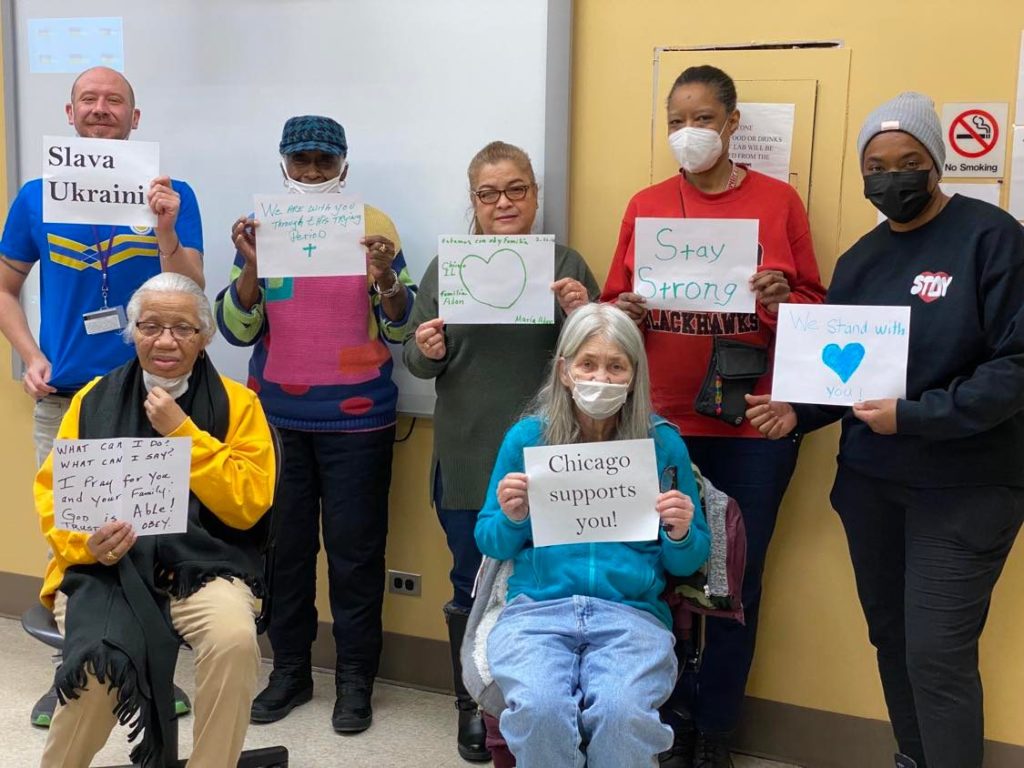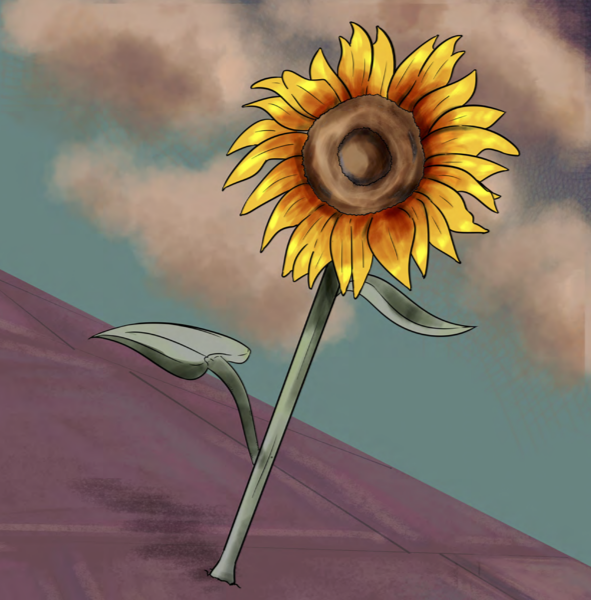I was teaching adult education at Harry S. Truman College when I met Olga. Every Friday, during our class break, we’d head over to the Emerald City Café—named after the Wizard of Oz, written in nearby Humboldt Park—and order double espressos. Sometimes Olga brought croissants with chocolate. We’d talk about trips, art, literature, politics, and afterwards have a smoke outside. Then we’d return to our computer class in Room L935 in the basement of Truman College where rows of old desktop computers sat on very thin tables. I’d plug in a projector, roll a chair to the front of the room, stand on it, and pull a string lowering the screen. We’d have class.
One of the most popular lessons was PowerPoint. We’d save presentations full of images, text boxes, transitions, and animations as video files and upload them to YouTube, where we’d then add music to the videos. The students were adults between the ages of twenty and ninety, and came from all around the world. For instance, Munever was in his eighties, from Bosnia, and worked on images of flowers. Mario was from Mexico and was in his fifties, creating videos about his family back home on the farm. Hugh was from Chicago, also in his fifties, and made videos of roller skaters. There were women from Nepal, Somalia, Afghanistan and Korea who made videos about education programs for girls, world travel, heart anatomy, and crochet. A woman in her nineties from a New Mexican reservation made videos about her pueblo’s history and people. In this small cinderblock classroom with no windows, we brought creativity, heart, and knowledge. Olga made videos about her granddaughter, cartoon skeletons dancing to jazz music underneath L tracks, and gardens as well as art museums in Paris.
At the beginning of the pandemic, Olga left Chicago to be with friends and family in Kyiv, Ukraine. She has a home there that has been in her family for generations. I reached out in early February to ask how she was doing and how people in Ukraine were feeling. A few days before the invasion, she wrote back and said her friend, an artist, had painted her portrait
For today: people are tired of being afraid and worried. Life goes on.
My friend painted my portrait.
Anxiety is in the air, but there is no panic.
The situation is escalated in the media. Many foreigners from different countries who live in Ukraine haven’t left yet.
And then she wrote again about her plans to go to France:
I’m ok. I’m in Kyiv. The situation around and inside is very disturbing. I think I’d better fly to Paris. I give myself 3-4 days. Sam, thank you so much for your letter. But as always, today is Friday, and our Emerald City Café is waiting for us I hope 🙂 Our coffee and cigarettes on Friday are our friendly creativity.
I remembered that it was at that café, just past the Red Line Wilson stop, where Olga told me she used to be a paleontologist, and how it was one of the best times in her life. She had discovered the skeletal remains of thousands of year old horses and excavated them to be studied. She’d tell me about the brutality the Soviet state and the effect it had on her and her family and friends. The Soviet state murdered and or sent the best and the brightest Ukrainians to horrific labor prisons.
I emailed Olga and asked if she brought the portrait that the artist Matvei Vaisbur created. She replied:
My portrait will be waiting for me in Kyiv. I’ll be in Paris for a few weeks and then {I’ll} come back.
I now teach at Olive-Harvey’s South Chicago Learning Center. As my class arrived that Saturday, they showed proof of their COVID-19 negative test results to Mr. Green, the security guard.
After getting some assignments out of the way, I shared with them how Olga was a student in this class for many years. I told them that some of the PowerPoint examples I used in class were created by her, and that she had escaped to France before the Russian bombing of her city, Kyiv—a city with nearly the same population as Chicago. I said that if they wanted to, they could write a message of support for her and her country, to lift her spirits during these trying and difficult times. No one hesitated. Their hearts had opened to Olga. These older adults and elders of the Southeast Side community wrote:
-
- We are with you through this trying period.
- Stay strong
- We stand with you!
- Estamos con ud y familia
- What can I do? What can I say? I pray for you and your family. God is able! Trust, love, obey.
- Chicago Supports you!
- Slava Ukraini!
Mr. Green, the security guard, took a class picture of us holding signs with the messages of solidarity to the Ukrainian people.

As an instructor of adult education, we learn from each other and create communities of friendship and support. Whether at Truman College or Olive-Harvey, we are here for each other.
On March 4, Olga wrote:
Everything that I love and everyone I love remaining in Ukraine is in danger.
Russia’s war in Ukraine is completely unacceptable. There is no justification for what Russia and its government is doing to Ukraine and the world. Putin is a war criminal and needs to be stopped. We are now in the second week of the invasion. The Russian military is bombing Ukrainian cities while its soldiers are shooting and killing people, including families. The international community needs to do more to stop and then arrest Putin for crimes against humanity. Send him and his generals to The Hague. End the war.
Samuel Du Bois is an educator at the City Colleges of Chicago, and is a writer represented by Craig Literary. This is his first story for the Weekly.


Thank you for this. I have family and friends in Poland and the Ukraine. I have family and friends that escaped this region or didn’t escape this region during World War II. I enjoyed the sharing of your classroom and the joy gained from teaching adult learners.
I agree with your final conclusion: “Russia’s war in Ukraine is completely unacceptable… The international community needs to do more to stop and then arrest Putin for crimes against humanity. Send him and his generals to The Hague. End the war.”